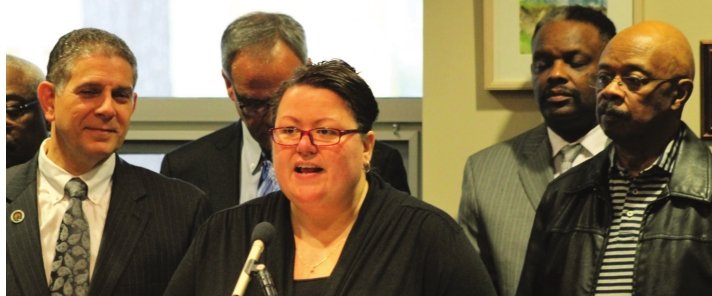
In a testy news conference last week, Lansing Mayor Virg Bernero leveled charges of racial and economic discrimination against four City Council members for not supporting tax relief for a proposed low-income housing project.
But City Council President Judi Brown Clarke, one of the mayor’s four targets, has countercharged.
She said the mayor’s accusation was based on a complaint orchestrated by the mayor. And she backs that up by citing a conversation with the project’s developer, Sam Saboury.
“Mr. Saboury contacted me the previous week and stated that he was receiving repetitive phone calls from Mayor Bernero asking him, pleading with him, to file a civil case,” Brown Clarke said. “It was something he did not want to do. He wanted to work with the Council to get this resolved and figure out what his other options were.”
Noiw comes the counter-countercharge.
Saboury, the developer, denied Tuesday Brown Clark’s allegation.
“This is false,” he said in a telephone interview. “She is making up stories everywhere. Her story changes every day” about this situation.
Shot back Brown Clarke after being informed of Saboury’s comments:
"He can deny it all he wants. We absolutely had the conversation. I wish to hell I had recorded it."
Brown Clarke challenged Saboury to a lie detector test
"I will meet him down at the police station and we can take a lie detector test side by side. Come on — I am ready."
Bernero at his news conference made no mention of his alleged calls to Saboury, who wants to build 23 low-income, senior and disabled persons housing units on the edge of Old Town. The $5.7 million project at 1119 N. Washington Ave would include 5,000 square feet of commercial space in addition to the housing units.
Saboury had asked the city for a PI- LOT — Payment in Lieu of Taxes — which allows developers to pay just a small percentage of the tax normally assessed a new building. Saboury was asking for a 4 percent PILOT. State law requires the City Council to approve PILOTs under 10 percent.
The PILOT for the project was rejected on a tie vote earlier this month, prompting Bernero’s discrimination charge. The mayor also took aim at Council members Carol Wood, Jody Washington and Adam Hussain, who with Brown Clarke''s opposition sank the PILOT proposal.
To support his claim, the Mayor announced that Saboury “is in the process” of filing a formal complaint with the U.S. Department of Housing and Urban Development. Saboury was not present at the press conference and was not quoted in a press release from Bernero.
Neither Bernero nor members of the Greater Lansing Clergy Forum provided specific examples of how the Council was perpetrating discrimination. However, Bernero, flanked by Julie Powers, executive director of the Greater Lansing Housing Coalition and members of the Greater Lansing Clergy Forum said the four Council members did so out of animus for the poor.
Efforts to reach the mayor for comment were unsuccessful.
Brown Clarke says the accusations are meant to deflect attention from the brewing conflict over various management decisions being made regarding city operations.
“It is very unfortunate that Lansing City Council members must take our focus away from current issues related to lack of transparency, like the partial release of the City Attorney’s separation agreement, her large severance payout, lack of clarification regarding what the Mayor did to the City Attorney that he will not waive his legal privilege on, information on other large payouts that he referenced in his Lansing State Journal interview, the NAPA contract and the potential of a Collective Bargaining violation, and the cutting of trees on the City of Lansing-owned Red Cedar Golf course,” she said in a press release Thursday night.
Bernero has said the $160,000 separation agreement with McIntyre was in the best interest of the city — something attorneys for the outside law firm Dykema Gossett supported in a legal memo paid for by the city to Interim City Attorney Joe Abood. He told the Lansing State Journal in an interview that voters who were displeased could vote against him the 2017 election.
Brown Clarke was critical of a decision to allow the removal of hundreds of mature trees from the former Red Cedar Golf Course land. That land is targeted for redevelopment in a massive, multimillion dollar project as well as a redesign of the massive Montgomery Drain that pollutes the Red Cedar River. The trees had to be removed, said Ingham County Drain Commissioner Patrick Lindemann, to address migration habits of endangered bats that are known to roost in the park. To prevent disruption to the bats, the trees had to be removed by the beginning of the month, before they returned from wintering down south.
That, of course, led to the inevitable question to Brown Clarke, who has been rumored to be considering a run for mayor.
Asked if she plans to run, she said:
“I haven’t ruled it out,” she said. “I know I have a lot of public support.”
She is consistent: She made basically the same comment the day after she was elected in 2013 to her Council seat.
Support City Pulse - Donate Today!
Comments
No comments on this item Please log in to comment by clicking here